CIA Sponsored Terror, Civil Liberties, Criminalizing Dissent, Guantanamo, Military Tribunal, Political Prisoner, Prison Industry, Targeting Muslims, Torture
Podcast: Play in new window | Download
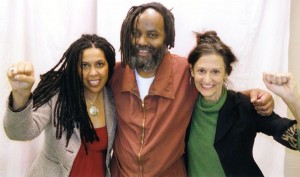
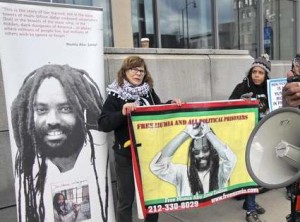
Mumia Abu-Jamal Update October 2018
Last week, attorneys for Mumia Abu Jamal argued in court that conflicts of interest led to unfair rulings against him in his longstanding case. As many know, Abu-Jamal was sentenced to death for the 1981 killing of Philadelphia police officer Daniel Faulkner. The case was riddled with constitutional violations, and his sentence was later commuted to life in prison without parole.
Recently, in the wake of the U.S. Supreme Court’s decision in Williams v. Pennsylvania, Mumia’s attorneys argued that his rights were violated after former district attorney Ron Castille failed to recuse himself in an appeals decision. At the time Castille was a state Supreme Court judge.
Judge Leon Tucker had asked the Philadelphia district attorney’s office to produce an internal memo that might show Castille— back when he was city district attorney — had direct involvement in pursuing Abu-Jamal’s death sentence. If he did, his later denial as Supreme Court justice of Abu-Jamal’s appeal, could be deemed biased.
Defense attorney Judy Ritter said: “Justice Castille has shown himself to be involved in this case, to be biased against a certain class of cases that our client falls into.” The Commonwealth argued that as district attorney, Castille was simply doing his job.
“It’s nothing remarkable that a DA would send a letter to the governor asking him to sign death warrants which the governor was required to do,” said attorney Tracey Kavanaugh. Emotions ran high, both inside and outside of the courtroom. Maureen Faulkner, the widow of Daniel Faulkner, stood up and cried in the middle of court proceedings when the judge announced that both sides would need to wait until December for any possible closure in the case. Presiding Judge Leon Tucker has indicated that he will make a ruling in the case some time after December 3, 2018.
Guest – Professor Johanna Fernandez, is a native New Yorker. She received a PhD in History from Columbia University and a BA in Literature and American Civilization from Brown University. Professor Fernández teaches 20th Century U.S. History, the history of social movements, the political economy of American cities, and African-American history. She has previously taught at Carnegie Mellon University in Pittsburg, PA and Trinity College in Hartford, CT and is, most recently, the recipient of a Fulbright Scholars grant to the Middle East and North Africa that will take her to Jordan in spring 2011, where she will teach graduate courses in American History. She is with the Campaign to Bring Mumia Home.
—-

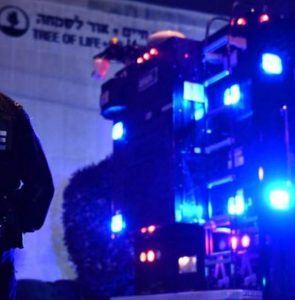
In Response to Pittsburgh, We Must Come Together as One
Last week, acts of hatred claimed the lives of 13 innocent persons in the United States. A white supremacist killed two African American persons in Kentucky. An anti-semite killed 11 Jewish persons in a synagogue in Pittsburgh where even more were wounded, including first responders and police officers.
Not surprisingly, the slaughter of the 11 Jews brought forth calls of the need for a strong Israel; the same response that followed anti-Semitic killings in France and Brussels.
It also inflamed political and theological differences between Israelis and American Jews. Israel’s Ashkenazi chief rabbi avoided saying “synagogue” because it is not Orthodox, but Conservative, a liberal branch of Judaism — because it is not Orthodox, but Conservative, one of the liberal branches of Judaism rejected by religious authorities who define the state’s Jewishness.
The attacker’s anti-refugee, anti-Muslim rants prompted some on the Israeli left — like many American Jewish liberals — compare the views of nationalistic leaders who influence their governments.
In Israel, longstanding animosity between left and right has escalated. Orthodox parties are hoping to increase their influence and Jewish law on day to day life; disputes about who cdan serve in the military and what stores can open on the Sabbath are rampant.
Guest – Phyllis Bennis is a fellow of the Institute for Policy Studies, where she works on anti-war, US foreign policy and Palestinian rights issues. She has worked as an informal adviser to several key UN officials on Palestinian issues. Her books including Calling the Shots: How Washington Dominates Today’s UN, and Understanding the Palestinian-Israeli Conflict.
—-

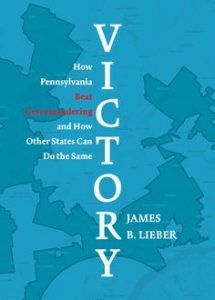
VICTORY: How Pennsylvania Beat Gerrymandering and How Other States Can Do the Same
An important victory against gerrymandering was recently won in the State of Pennsylvania in the case of League of Women Voters of Pennsylvania v. Commonwealth of Pennsylvania.
The first paragraph of the complaint lays it out. “This case is about one of the greatest threats to American democracy today: partisan gerrymandering. A partisan gerrymandering occurs when the political party in control of redistricting redraws congressional or state legislative districts to entrench that party in power and prevent voters affiliated with the minority party from electing candidates of their choice. The result is that general election outcomes are rigged – they are predetermined by partisan actors sitting behind a computer, and not by the voters.“
In Pennsylvania although the Democrats have more supporters than the Republicans Republicans had 13 seats in the US Congress and the Democrats had only five.
The U. S. Supreme Court has not been willing to rule on gerrymandering taking the position that there is no clear way to determine if there has been gerrymandering and therefore it is a non-judicable issue.
To get around this in 2018 Pennsylvania activists engineered a brilliant legal effort in the the state courts of Pennsylvania to attack the lopsided redistricting, and won after fighting pitched battles all the way up to the state Supreme Court. Now activists around the country can do the same. The next congressional redistricting occurs after the 2020 census: progressive need to be ready well before then.
We speak today with constitutional litigator James R. Lieber who has provided a real time report on effective trial lawyers, working to facilitate the will of the people. He explains the strategies of counsel and the evidence presented and has provided a roadmap to social justice litigants for pursuing constitutionally protected claims in state court based on the state constitution and avoiding federal review.
Guest – Attorney James B. Lieber is the author of 3 previous books, and a lawyer who focuses on constitutional, civil rights, and discrimination cases. He has won two cases before the U. S. Supreme Court and is widely published in magazines of national stature.
—————————————–

—————————————–
CIA Sponsored Terror, Civil Liberties, Criminalizing Dissent, Crony Capitalism, Human Rights, Political Prisoner, Prison Industry, Supreme Court, Surveillance, Targeting Muslims, Truth to Power, War Resister
Podcast: Play in new window | Download

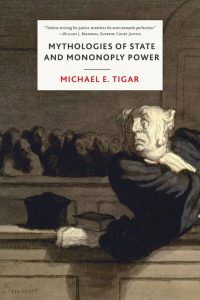
Attorney Michael Tigar: The Mythologies of State and Monopoly Power
The American criminal justice system is buttressed, sustained and perpetuated by various myths. These myths dominate legal ideology. The most important of these myths concern racism, criminal justice, free expression, workers’ rights, and international human rights. “Ordinary private law categories of property, contract, and tort perform the same social function,” Michael Tigar writes in his important new book “Mythologies of State and Monopoly Power.“
Michael Tigar has worked for more than 50 years with movements for social change as a human rights lawyer, law professor, and writer. He believes that busting these myths is the work of movement lawyers.
Noam Chomsky has written that “for anyone concerned with the rule of law, or more generally with the real significance of freedom and justice, Michael Tigar’s book is “a highly informed and carefully argued study that should be essential reading.”
The book is beautifully written, learned, and profoundly insightful. In a better world Michael Tigar would be a justice of the United States Supreme Court.
The Michael Tigar Papers Launch University of Texas
Tigarbytes.blogspot.com
Guest – Michael Tigar, emeritus professor of law at Duke University and at Washington College of Law. He has been a lawyer working on social change issues since the 1960s. He has argued numerous cases in United States Supreme Court and many Circuit Courts of Appeal. His books include “Law and the Rise of Capitalism”, “ Fighting Injustice ”, and the forthcoming Mythologist of State and Monopoly Power.“
——————–

——————–
Civil Liberties, Criminalizing Dissent, Human Rights, Hydraulic Fracturing, Political Prisoner, Prison Industry, Surveillance, Targeting Muslims, Torture, Truth to Power
Podcast: Play in new window | Download
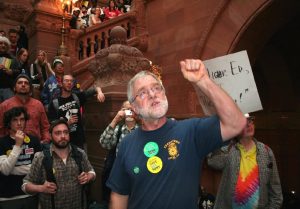
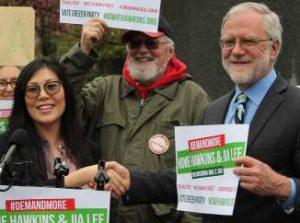
Green Party Candidate for New York Governor: Howie Hawkins
Former United States President Jimmy Carter has pointedly observed that the United States is not a democracy, it is an oligarchy. That is, it is a country ruled by a handful of rich people, the 1%, at the expense of the vast majority, the 99%, the famous description by the Occupy Movement.
The political and ideological mechanism for keeping this state of affairs Is the two party system in the USA, which in reality, as independent presidential candidate Ralph Nader has written, is really one party of big business with two wings, the Republicans and the Democrats.
Although the two party system was not mentioned in our constitution, state laws make it extraordinarily difficult for a third, independent, party to get on the ballot. Their ideas receive little media exposure reinforcing their exclusion.
This lack of the political process even as we are witnessing a radicalization, especially among young people, has led to a discussion on the left among socialists, democratic socialist, and progressives generally about how to move forward. The main question being debated is “do we support socialists who run on the democratic party ticket“ or do we stay independent of the democratic party or, do we work both inside and outside of the Democratic Party? Ballot Access News
Guest – Howie Hawkins, retired teamster from Syracuse, New York and the Green party candidate for New York governor. He previously ran as a The Green Party’s gubernatorial candidate in 2010 and 2014. During the later campaign he received 5% of the vote. He is the author of the recent article “the case for an independent left party: from the bottom up.“. It was published in Black Agenda Report.
—-
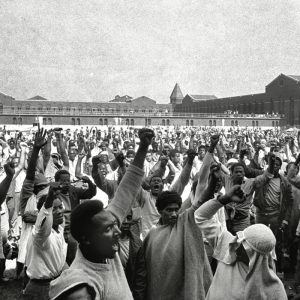
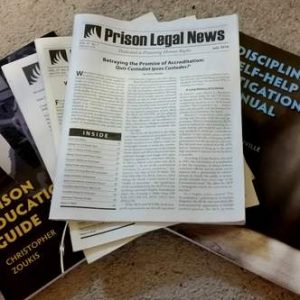
Nationwide Prison Strike 2018
Slavery never ended, human rights attorney Bryan Stevenson has observed, it just evolved. One form of this evolution is the huge number of African-American men in America’s prisons and the conditions of their confinement.
More than half of America’s 2.3 million prisoners are African-American. Many prisoners, black, brown, and Latino, went on strike on August 21. The strike ended on September 9, 2018. The prisoners did work stoppages, sit-ins, commissary boycotts , and hunger strikes to demand major reforms to our country’s prison and criminal justice systems. They demanded humane living conditions, access to rehabilitation, sentencing reform, and an end of what they termed “modern day slavery.“
Guest – Paul Wright, founder and Executive Director of the Human Rights Defense Center. He is also the editor of Prison Legal News, the longest running independent prisoner rights publication in US history. A former prisoner himself, Paul Wright was behind bars for 17 years in the state of Washington until his release in 2003.
——————

——————
CIA Sponsored Terror, Civil Liberties, Criminalizing Dissent, Human Rights, Political Prisoner, Prison Industry, Supreme Court, Truth to Power
Podcast: Play in new window | Download
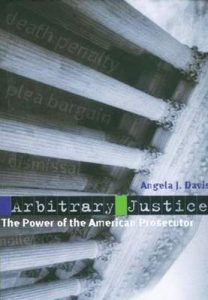
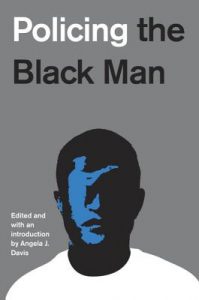
Attorney Angela Davis: Arbitrary Justice
“In the halls of justice”, it has been quipped, “the only justice you find is in the halls.” H. Rap Brown, a leader of SNCC, the Student Non-violent Coordinating Committee, said that justice in America means “just us”. There are 2.3 million people in American prisons today. A great proportion of them are African-Americans. If you assume Europe has the same social situation that we do in America, it is a telling fact that we have seven times as many prisoners. Part of the explanation for this phenomenon, In addition to the racist nature of the United States of America, is the power that the American prosecutor has. It is the power to choose whom to prosecute and for what crime. It is the power to obtain convictions, not to seek justice. It is a power that is discretionary and open to abuse. This abuse is rarely reviewable or punished.
Guest – Attorney and Professor Angela J. Davis, author of Arbitrary Justice: The Power of the American Prosecutor. Her most recent book “Policing the Black Man” covers the key issues of the Black Lives Matter movement. Angela J. Davis, professor of law at American University Washington College of Law, is an expert in criminal law and procedure with a specific focus on prosecutorial power and racism in the criminal justice system. Davis previously served as director of the D.C. Public Defender Service, where she began as a staff attorney representing indigent juveniles and adults. She also served as executive director of the National Rainbow Coalition and is a former law clerk of the Honorable Theodore R. Newman, the former Chief Judge of the D.C. Court of Appeals. Davis is the author of Arbitrary Justice: The Power of the American Prosecutor
———

———
Civil Liberties, Criminalizing Dissent, Habeas Corpus, Human Rights, Political Prisoner, Prison Industry, Supreme Court, Surveillance, Torture, Truth to Power
Podcast: Play in new window | Download


Holding Smart City Projects Accountable – Sidewalk Labs Toronto
Around the world, countries are talking about the idea of, and developing plans to implement, so-called “smart cities.” Smart Cities are urban areas that use electronic data to collect information, which is then used to manage financial assets and other municipal resources. Data is collected from citizens and electronic devices, and is then processed and used to monitor and inform the management of traffic, transportation systems, hospitals, schools, law enforcement, water supplies, and other community services, such as libraries.
The Smart City concept uses information and communication technology to interact with the cities infrastructure and to monitor its development and evolution. Proponents claim it will increase efficiency. Information and Communication Technology is used to increase the contact between local citizens and government to reduce costs and enhance the quality and interactivity of urban spaces within cities. Critics say it vests too much power in profit-minded corporations, and that total connectivity may makes smart cities a hacker’s dream.
In 2018, the Canadian government launched a Smart Cities Challenge offering prizes up to $50 million dollars for towns and cities that will work to improve residents’ lives through innovation, data, and connected technology. A few months earlier, in October 2017, the Google-affiliated company Sidewalk Labs announced plans to build a neighborhood “from the Internet up” along Toronto’s waterfront in a spot known as Quayside. The goal is to create an “advanced microgrid” to power electric cars, bring down housing costs, improve recycling and use data to improve public services. The project has had support from Prime Minister Justin Trudeau who declared it a “testbed for new technologies.”
Guest – Bianca Wylie, an open government advocate with a background in technology and public engagement, Bianca leads work on public sector technology policy for Canada at Dgen Network and is a co-founder of Tech Reset Canada.
—-
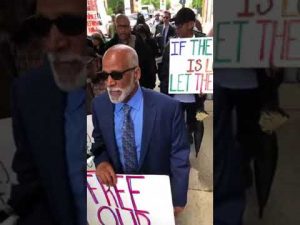
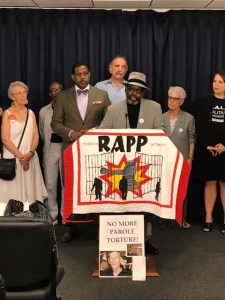
The New York State Parole Board: Failures in Staffing and Performance
“All people have in them a dream of being free again,” writes D.B., a 40-year-old who has spent 21 years in prison. During this time, D.B has had a total of 12 hearings at the Department of Corrections: four postponements, two de novo hearings, and eight board hearings.
Like D.B., many inmates have the same dream of being free, but for those being reviewed by parole commissioners W. William Smith and Marc Coppola, their chances are slim. In an extensive report co-authored by the RAPP (Release Aging People in Prison) and the Parole Preparation Project, “The New York State Parole Board: Failures in Staffing and Performance” outlines the serious problems within the New York State Parole Board, focusing on the board’s inability to perform while significantly under-staffed and allowing the continued malpractice of board commissioners Marc Coppola and W. William Smith.
W. William Smith has been on the board since 1996 when he was appointed by Governor George Pataki. He was re-appointed by Governor Cuomo in 2017. Although the rules and regulations around the Parole Board have been updated and modernized, Smith continues to deny parole to people convicted of violent crimes despite demonstrated rehabilitation.
Marc Coppola, like Smith, frequently denies parole because of a person’s crimes rather than their demonstrated low level of risk to public safety. His political ties and financial gifts to the elected officials in charge of confirming parole board members suggests that he is not a fair or ethical candidate for the position of Parole Commissioner. Both Smith and Coppola have been known to be condescending and unprofessional in their interviews for the parole board.
Guest – Dave George, Associate Director of RAPP or Release Aging Persons in Prison.
Guest – Jose Saldana, Jose was recently released from prison after serving 38 years. He works with parole reform organizations and RAPP.
—————-

—————-
CIA Sponsored Terror, Civil Liberties, Criminalizing Dissent, Guantanamo, Human Rights, Political Prisoner, Prison Industry, Supreme Court, Surveillance, Torture, Truth to Power, War Resister
Podcast: Play in new window | Download
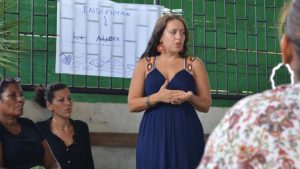
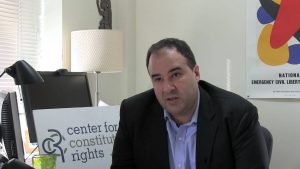
Challenges Lawyers Face As Democratic Institutions Dismantled
What are the the challenges lawyers on the left face in this historic period? That is the concern of today’s show. Since 911 we have seen the consolidation of an authoritarian state. The radical right working over the last 30 years and funded by the Koch brothers and their billionaire allies, are strategic and have been very successful.
They now hold the reins of power in 33 states, the Senate, House of Representatives, the Supreme Court, and the presidency. Their ultimate goal is to “dismantle the administrative state“, which is their formulation for taking away every social benefit that we have earned since 1930s. To prevent us from fighting back they have restricted democracy with voter suppression and gerrymandering. The right wing Supreme Court has declared that corporations are people and have the right to unlimited amounts of corporate dark money. Our access to information has also been constricted. Five major corporations own all the major media. New algorithms by Google and Facebook restrict access to people looking for alternative media, like Law And Disorder Radio.
We are also seeing the dismantling of programs that benefit people and the hollowing out of the democratic rights necessary to defend them. Racism and dehumanization are employed to divide and conquer. But at the same time we have seen the growth of social movements with our movement attorneys right in there fighting as important auxiliaries. Since 911 and the passage of the Patriot Act government surveillance of our private lives and political affiliations has become pervasive.
Guest – Attorney Natasha Lycia Ora Bannan, President of the National Lawyers Guild.
Guest – Attorney Baher Azmy, the litigation director at the center for constitutional rights National Lawyers Guild – Chicago 1937 as an alternative to the all white American Bar Association. It’s gotten principle was announced: human rights over property rights. The center for constitutional rights was founded by civil rights attorneys who had been active in the south in 1966 including William Kunstler, the attorney for Martin Luther King.
—-


Julian Assange And Political Asylum In Danger
WikiLeaks founder the truth telling publisher Julian Assange is in certain and imminent danger of being sent from England to America where he would likely be tried for espionage, a crime that carries the death penalty.
Assange and WikiLeaks have revealed American war crimes in the middle east, CIA global machinations , and the work of Clinton Democrats in preventing the popular Bernie Sanders from heading up the party ticket.
Assange is presently holed up in the Ecuadorian embassy in London where he was granted political asylum six years ago by past leftist president Rafael Correa. But now, with the change of presidents in Ecuador, Assange has been cut off from the outside world. He has no phone, no computer, and no visitors.
The fresh offensive against him occurred the day after American General Joseph DiSalvo, the head of the US Southern Command, the Pentagon’s arm in Latin America, visited the new right wing Ecuadorian President Lenin Moreno. Irene was told that if he did not cooperate he would not get an International Monetary Fund loan. Moreno has said that Assange is “an inherited problem” and is seeking s better relationship with the United States government, to whom he has already granted a military base.
Guest -Attorney Renata Avila has represented International human rights lawyer and digital rights advocate. In her practice, she represented indigenous victims of genocide and other human rights abuses, including the prominent indigenous leader and Nobel Peace Prize Laureate Rigoberta Menchu Tum. She also represented awarded journalist Julian Assange and Wikileaks since 2009. Avila sits on the
Board of Creative Commons, is a trustee of the Courage Foundation, – an organisation set up to assist whistleblowers at risk – and is an advisory board member of Diem25, a movement to democratise Europe launched by Yanis Varoufakis. Her book Women, Whistleblowing Wikileaks” was published by OR Books. She is currently writing a book on Digital Colonialism and regularly writes for several international newspapers.
—————-

—————-






















